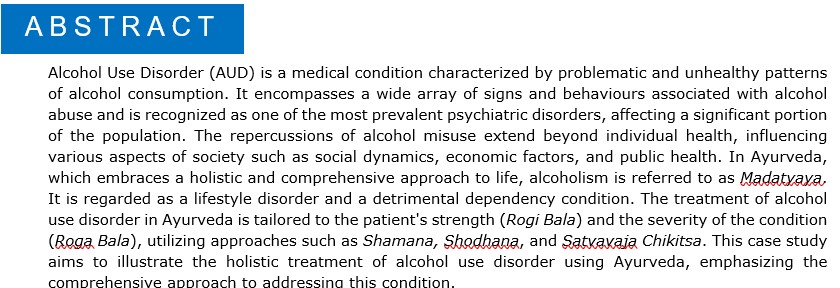A case study on the management of alcohol dependence through Ayurveda
DOI:
https://doi.org/10.21760/jaims.9.5.48Keywords:
Madatyaya, Alcohol dependence, Yastimadhu Ksheera BastiAbstract
Alcohol Use Disorder (AUD) is a medical condition characterized by problematic and unhealthy patterns of alcohol consumption. It encompasses a wide array of signs and behaviours associated with alcohol abuse and is recognized as one of the most prevalent psychiatric disorders, affecting a significant portion of the population. The repercussions of alcohol misuse extend beyond individual health, influencing various aspects of society such as social dynamics, economic factors, and public health. In Ayurveda, which embraces a holistic and comprehensive approach to life, alcoholism is referred to as Madatyaya. It is regarded as a lifestyle disorder and a detrimental dependency condition. The treatment of alcohol use disorder in Ayurveda is tailored to the patient's strength (Rogi Bala) and the severity of the condition (Roga Bala), utilizing approaches such as Shamana, Shodhana, and Satvavaja Chikitsa. This case study aims to illustrate the holistic treatment of alcohol use disorder using Ayurveda, emphasizing the comprehensive approach to addressing this condition.
Downloads
References
Brahmanand Tripathi, Charak Samhita of Agnivesha, Choukhambha publication, 5th edition, 1998, Chikitsa Sthana 24, verse no.55, page no.812.
Acharya Agnivesh. Chikitsha shtana 24/68. In, Vaidya Yadavji, Trikamji Acharya(ed). Charaka Samhita Ayurved Dipika, Chakrapanidatta commentary, Fifth edition. Varanasi, Chaukhambha, Surabharati publication, 1992; p. 586.
Kaplan & Sadock: Comprehensive textbook of psychiatry, 11.2, Alcohol – Related Disorders, Lippincott Williams & Wilkins, publication, eighth edition, 2005, p. 116
Sudarsana S. Chaukhamba Prakashan, Reprint edition; Varanasi: 2019. Sastri. Commentary by shrivijayaraksita and srikanthadatta of madhava nidanam of sri madhavakara with the Madhukosa Sanskrit commentary, Part 1, Madatyaya adhyāya; p. 397. [Chapter 18]
Pastorino G., Cornara L., et al. Liquorice (Glycyrrhiza glabra): a phytochemical and pharmacological review. Phytother Res. 2018;32(12):2323–2339. doi: 10.1002/ptr.6178.
Sharma V., Sharma R., et al. Role of Vacha (Acorus calamus linn.) in neurological and metabolic disorders: evidence from ethnopharmacology, phytochemistry, pharmacology and clinical study. J Clin Med. 2020;9(4):1176. doi: 10.3390/jcm9041176.
Manouze H., Bouchatta O., et al. Anti-inflammatory, antinociceptive, and antioxidant activities of methanol and aqueous extracts of anacyclus pyrethrum roots. Front Pharmacol. 2017; 8 doi: 10.3389/fphar.2017. 00598.














